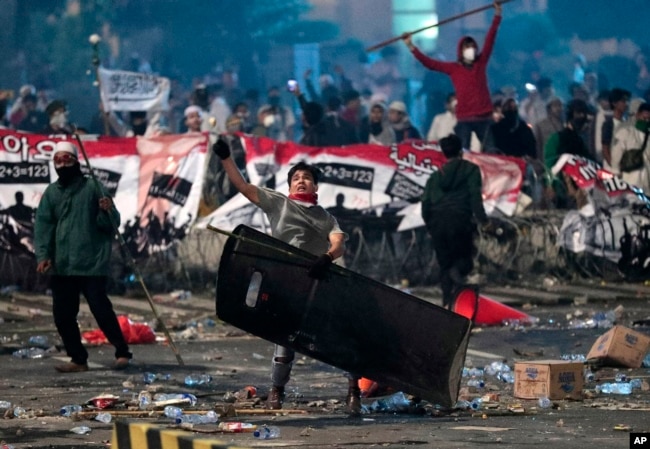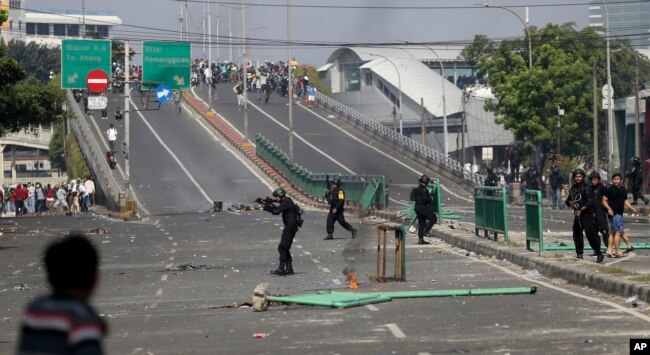Rights groups in Indonesia investigating charges of police brutality are complaining that police are operating with impunity against demonstrators after the release of election results last week, VOA news reports.
The investigation is examining the police response to rioters, who reportedly attacked a Jakarta police academy during protests. City of Jakarta Governor Anies Baswedan says eight people were killed.
“As a moment of moral clarity, you can’t deny that it was a grave oversight. It could annul the good perception that the public has of the police,” Usman Hamid, country director of the Indonesian chapter of Amnesty International, told VOA. Noting that police have been praised by some for their restraint in their handling of the riots, he said, “We demanded that the police investigate the violence, identify the suspects openly, and give justice to the victims.”
Rioters threw rocks and Molotov cocktails last week at the police academy and in front of a building housing the elections oversight body. The riots followed peaceful protests against presidential election results.
In video authenticated by National Police, 30-year-old Andri Bibir is seen being hit by police officers. “Even killers and corruptors have to stand before the law,” Usman said.
Andri says it is him being beaten in the video and admitted at a news conference conducted by National Police that he was collecting rocks to throw.
The mass protests — in which demonstrators demanded the April 17 Indonesian elections results confirming President Joko Widodo’s re-election be thrown out for foul play — initially were peaceful. But National Police say new groups entered several Central Jakarta neighborhoods and started rioting. Police deployed tear gas and fired blank bullets in response.
National Police General Dedi Prasetyo told VOA an investigation of the police to determine what happened and who is responsible “will be put in place.” He previously said no officers were armed with real bullets.
The riots led to blocked streets, including the major thoroughfares of Medan Merdeka Barat and Imam Bonjol roads. The Indonesian government also restricted use of Instagram and Facebook to curb the spread of rumors — action that rights groups decried.
Political opposition groups protested official election results when they were released last week. Many claimed foul play, including the case of pre-marked ballots in Malaysia, took place. The police also have charged politician Eggi Sudjana and former military officer Kivlan Zen with treason. Additionally, the National Police last week named former military officer Soenarko for allegedly supplying firearms to protesters.
Incumbent President Joko was re-elected in Indonesia’s April 17 vote. His opponent, Prabowo Subianto, and his legal counsel filed an appeal Friday to the Constitutional Court.
Police impunity
National Police Commissioner Poengky Indarti said the brutality during last week’s riots cannot be considered impunity. “There’s still legal process that the National Police go through,” she said. “Violence can be a last resort if the [acts committed by rioters] endanger the lives of the police, the people or the loss of property.”
Poengky says journalists and medical teams also were subjected to police brutality, adding that both sides’ participation in the violence should be examined. “But I agree that excessive force should not be used,” she said.
In 2011, police officers violently dispersed the Third People’s Congress on the country’s easternmost island of Papua. In 2014, police and military personnel fired bullets at 800 peaceful demonstrators, leaving six dead. On Papua alone, Amnesty International says that between January 2010 to February 2018, there were 69 unlawful killings perpetrated by the military or police.
Usman of Amnesty International said the case of Andri Bibir is an example of the impunity in play.
“The punishment for those who collected and threw the rocks is different,” he said. “Do the people who collect rocks need to be instantly executed by getting stomped, kicked or dragged [like Andri]?”


